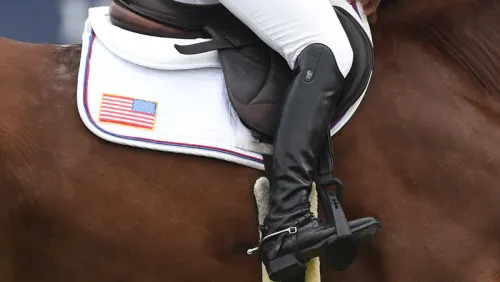Olympic show jumper Laura Kraut, of Royal Palm Beach, Fla., was mystified when she received notification around Christmas of an administrative infraction from the Fédération Equestre Internationale for the use of lidocaine/hydroxylidocaine.
It was approximately six weeks after the Washington International Horse Show CSI-W, held Oct. 25-30, 2016, in Washington, D.C., where the 12-year-old Dutch Warmblood gelding Andretti S (Corland—Tabelle S, Animo) tested positive for the prohibited substances. Both substances are considered local anaesthetic agents.
“When I got the notification, I couldn’t for the life of me even think of what it was,” she said. “Then my groom started wondering if it was maybe a cream that he bought.”
Her groom, whom Kraut elected not to name, is from England, and when Andretti S presented with a small cut, he went to the local drugstore and picked up what he believed to be the U.S. equivalent of a cream he used in England.
“He went and found the tube. We still had it right here. Unfortunately, it had lidocaine in it, and he put it on, and that’s what happened,” said Kraut. “It is actually a hemorrhoid cream, but hemorrhoid cream in England does not contain those ingredients. He feels terrible and is a wonderful, wonderful groom and absolutely meant no harm. In fact, he was doing what he thought was the right thing to do, to look after the horse, and so it’s a pity, but those are the rules.”
Kraut was required to forfeit any prize money, and no further action was taken.
ADVERTISEMENT
“The rule is the rider is ultimately responsible, and I probably should have looked at it and checked it over, but I didn’t so that’s where I am at fault. I think the FEI is handling it as fairly as they can,” she said.
Darragh Kenny, who rides for Ireland but is based in Wellington, Fla., also received a violation on Nov. 28, 2016, when the 10 year-old gelding Bolero 111, a Belgian Warmblood (Chatman—Walentina van’t Mertens E, Darco), tested positive for altrenogest during the Vilamoura CSI*** in Portugal, Sept. 27-Oct. 2, 2016.
“It was a minor infraction,” he said. “It was called a ‘controlled substance’ because it is not actually illegal.”
Altrenogest is a hormone typically given to mares to suppress estrous.
“The only issue was that one of my grooms fed it to a gelding instead of a mare, by accident. The feed buckets got mixed up, and the horse got the wrong feed, and because of that I ended up getting a positive test for a horse that I was just jumping in 1.35[-meter] classes at a small show in Vilamoura,” said Kenny.















